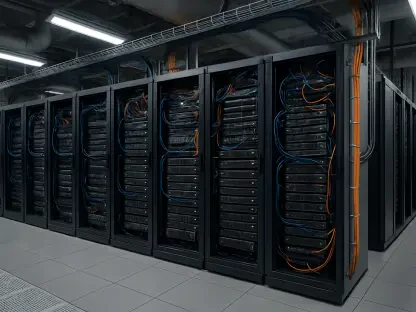In the quiet expanse of Coweta County, Georgia, roughly 40 miles southwest of Atlanta, a heated controversy has erupted over the proposed construction of sprawling data centers, threatening to reshape the rural landscape. A pivotal moment came on August 19, when county commissioners, confronted by an overflow crowd of passionate residents in Newnan, opted to delay a crucial vote on new regulatory ordinances for these massive projects. The scene was charged with emotion, as many attendees donned red to symbolize their unified opposition, highlighting a deep rift between community values and industrial ambitions. This decision to postpone has amplified local voices, setting the stage for a broader debate about the future of technology-driven development in the area. As tensions simmer, the situation in Coweta County mirrors a national struggle to balance economic growth with environmental and cultural preservation, drawing attention to the profound implications of such projects on small-town life.
Community Concerns and Resistance
Rising Voices Against Development
The public meeting held on August 19 in Newnan became a powerful platform for Coweta County residents to express their mounting concerns over data center proposals. Clad in red as a visual statement of resistance, attendees packed the venue, voicing fears that these industrial complexes could irreparably harm their way of life. Key worries centered on noise pollution from ceaseless operations, air quality degradation due to on-site generators, and the erosion of the county’s serene rural character. Beyond these tangible impacts, there was a strong push for enforceable regulations, with demands for strict noise limits and robust pollution controls to mitigate potential damage. Residents also called for financial assurances to cover decommissioning costs, ensuring that abandoned projects would not become lingering burdens on the community. This collective outcry underscored a profound desire to protect the essence of their hometown from the encroachment of industrial sprawl.
The fervor at the meeting was not just about immediate effects but also about safeguarding a legacy for future generations. Many in the crowd emphasized the need for transparency and accountability from local officials, feeling that their concerns had been sidelined in favor of developer interests. The visual unity of red attire served as a stark reminder of the community’s determination to be heard, pushing for ordinances that prioritize local well-being over unchecked growth. Frustration was palpable as residents recounted personal stories of how similar developments elsewhere had disrupted quiet neighborhoods, fueling their resolve to prevent a similar fate. This grassroots movement has gained momentum, reflecting a broader sentiment that technological advancement should not come at the expense of community identity. The delay in voting offered a momentary reprieve, but it also heightened the stakes for the upcoming discussions, as locals brace for a prolonged battle over their county’s future.
Environmental and Cultural Stakes
Environmental concerns loom large in the opposition to data centers in Coweta County, with many residents alarmed by the immense resource demands these facilities impose. National projections from the U.S. Department of Energy suggest that power consumption by data centers could triple within the next five years, potentially straining local grids and increasing reliance on fossil fuels. Advocates like Chris Manganiello from Chattahoochee Riverkeeper have highlighted the unprecedented energy and water needs, arguing that such projects should be confined to designated industrial zones to minimize ecological harm. The fear is that unchecked development could exacerbate climate challenges, placing additional pressure on already limited local resources. This perspective has resonated deeply, as residents grapple with the idea of sacrificing environmental health for economic promises that may not materialize.
Beyond the ecological impact, there is a profound cultural dimension to the resistance, with fears that historical Native American sites could be jeopardized by construction. The potential loss of these irreplaceable landmarks has struck an emotional chord, uniting community members in a shared mission to preserve their heritage. Many argue that the rural charm and historical significance of the area are non-negotiable assets that define Coweta County’s identity. This blend of environmental and cultural anxieties has fueled a robust grassroots effort to demand stricter oversight and protective measures. The postponed vote has provided a window for further dialogue, but it also underscores the urgency of addressing these intertwined issues before irreversible changes occur. As the community prepares for the next meeting, the balance between progress and preservation remains a central point of contention.
Economic Promises vs. Skepticism
Developer Claims of Prosperity
On the opposing side of this contentious debate, developers champion the economic advantages that data centers could bring to Coweta County. Projects like the $17 billion hyperscale initiative known as Project Sail, proposed for the rural Sargent area, are pitched as transformative opportunities. Proponents, including joint ventures between major firms, assert that the influx of tax revenue could significantly enhance local services, from schools to infrastructure. They paint a picture of job creation and long-term financial stability, suggesting that such developments could position the county as a hub for technological innovation. This narrative of prosperity is often framed as a chance to modernize and elevate the region’s economic standing, appealing to those who envision growth as a pathway to a brighter future for the community.
However, the promises made by developers are met with cautious scrutiny, as the scale of benefits often hinges on projections rather than guaranteed outcomes. Supporters argue that the strategic location of Georgia, recognized as the fastest-growing data center market in the U.S., makes Coweta County an ideal candidate for such investments. They emphasize the potential for ancillary businesses to emerge, further boosting the local economy. Yet, there is an underlying tension in these claims, as the immediate benefits for residents remain unclear amidst the massive resource demands of projects like Project Sail. The developers’ vision of progress stands in stark contrast to community fears, creating a divide that has yet to be bridged. As the delayed vote looms, these economic arguments continue to be a focal point, with proponents pushing for acceptance while acknowledging the need for some regulatory balance.
Doubts and Calls for Caution
Skepticism runs deep among Coweta County residents regarding the economic windfalls touted by data center developers. Voices like Ron Bockrath have urged county commissioners to look beyond the glossy promises and examine the experiences of other communities where similar projects fell short of expectations. In many cases, the anticipated job creation and revenue boosts proved fleeting, leaving locals to deal with the aftermath of industrial presence without the promised prosperity. This cautionary stance has resonated with a significant portion of the community, who fear that the long-term costs—both financial and social—could outweigh any short-term gains. The call for more thorough research before approving ordinances reflects a broader demand for evidence over speculation in shaping the county’s future.
Adding to this doubt is the concern over transparency in the decision-making process, with some residents pointing to evidence of developer influence on draft regulations. Public records have raised questions about the impartiality of local governance, further eroding trust in the economic narratives presented. The community’s insistence on verifiable data and concrete commitments from developers highlights a pragmatic approach to the debate, prioritizing tangible outcomes over optimistic forecasts. As the postponed vote approaches, this skepticism continues to shape public discourse, pushing for a critical evaluation of whether the economic benefits justify the risks. The delay in decision-making has become a pivotal moment for residents to demand clarity, ensuring that any progress does not come at an unacceptable cost to their way of life.
Reflecting on a Pivotal Moment
Lessons from a Community Stand
Looking back, the decision on August 19 to delay the vote on data center regulations in Coweta County marked a significant turning point in the clash between technological expansion and local priorities. The overwhelming turnout of residents, unified in their opposition, sent a clear message to county commissioners about the depth of concern surrounding projects like Project Sail. Their demands for stringent rules on noise, pollution, and cultural preservation underscored a collective resolve to protect the rural essence of their home. This moment of postponement was not just a procedural delay but a powerful acknowledgment of community influence, compelling officials to reconsider the pace and direction of industrial growth. It highlighted how grassroots efforts could challenge even the most ambitious development plans, setting a precedent for other regions facing similar dilemmas.
Path Forward with Balanced Oversight
Reflecting on the events, the delayed vote opened a critical window for Coweta County to reassess its approach to data center developments with an eye toward sustainable solutions. As the rescheduled hearing at a larger venue approached on September 11, it became evident that fostering transparent dialogue between residents, developers, and officials was essential. Crafting ordinances that address environmental impacts through restricted zoning and enforceable limits on resource use could serve as a model for balancing progress with preservation. Additionally, ensuring that economic benefits are backed by binding commitments rather than mere promises might rebuild trust. Moving forward, engaging independent experts to evaluate long-term impacts and involving the community in shaping policies could pave the way for a more inclusive process. This historic standoff in Coweta County stands as a reminder that technological advancement must align with local values to achieve lasting harmony.









